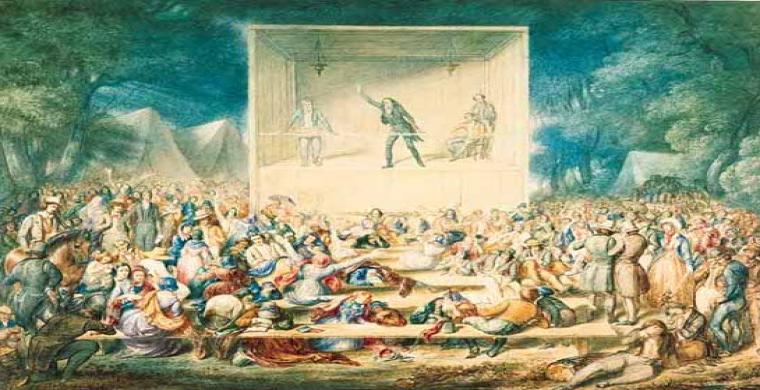"Evangelicals Are in the Arena -- And Must Not Leave It"
By Rob Schwarzwalder
http://www.christianheadlines.com/
July 22, 2014
Evangelicals’ mistakes in public life make snarky headlines all too frequently. But that doesn’t mean they’re always wrong.
Sometimes we’ve been too strident, so earnest and overly insistent, we make finding common ground virtually impossible. Name-calling for Jesus never honors Him.
Sometimes we’ve been too judgmental, quick to warn (rather theatrically) of God’s impending wrath on America or those we oppose politically.
Sometimes we’ve let political action supersede Christian evangelism, letting our temporal passions, however legitimate, override our Christ-given duty to fulfill the Great Commission.
Sometimes we’ve depersonalized our opponents, objectifying them with epithets instead of considering how we might both show them the love of Christ and persuade them concerning their political ideas.
Sometimes we’ve been too easily duped, ready to believe things we’re told by political and pastoral authorities because they use words and phrases that resonate with us and because we fatally place our hope in princes.
Sometimes we’ve oversimplified complex issues, reducing conflicts to (sometimes angry) slogans rather than providing humble consideration and prudential judgment.
Sometimes we’ve worshipped idols of political power, thinking that if we could only elect the “right” people and pass the “right” laws, our opponents would slink away and we could create the land of glory in the lower 48.
Sometimes our leaders have been crass, cutting, and shrill, saying things that make any serious Christian cringe.
Sometimes we’ve been activated more by frustration than wisdom, allowing the pain we feel in seeing our culture erode to overwhelm strategic, loving thinking, and thereby launching off into initiatives that are doomed to failure from the outset.
Sometimes.
Yet in the public square, Evangelicals get a lot of things right.
We’ve born prophetic witness to the teachings of the Bible as they relate to public action and popular culture, a witness that was missing for decades.
We’ve stood against the destruction of unborn life and the dehumanization of their mothers, politically and in very tangible, compassionate ways.
We’ve sought to re-elevate the central role family plays in the lives of children and the culture broadly, encouraged marital fidelity, and worked to preserve marriage as the union of one man and one woman, for life, for the good of all around them.
We’ve raised the moral dimensions of various issues during an era in which moral relativism, post-modern deconstructionist theory, and basic ethical confusion have discouraged and often belittled the very ideas of right and truth.
We’ve cautioned that God is personal, just and the Sovereign of history; a truth that history itself bears witness to as nations that abandon Him fall through their own decay.
We’ve ministered to those in need, whether sexually trafficked or impoverished or malnourished or victims of natural disaster or diseased or exploited or addicted or homeless, in countless ways and often at great personal and social cost.
We’ve warned wisely of the risks imposed by the gods and obsessions of every age. From Carl Henry to Chuck Colson, David Wells to Herbert Schlossberg, the Evangelical critique has been intensive and frequently profound.
We’ve been stereotyped, ridiculed, dismissed as living anachronisms and demeaned as “poor, undereducated, and easily led” (in the words of a 1990s-era Washington Post comment). We’ve not always enhanced our credibility when those seen as Evangelical leaders reacted with rage to such designations or, on the other hand, internalized them without qualification and engaged in rhetorical self-flagellation, virtually apologizing for trying to advance biblically inspired policies.
We’ve done what many of our critics have asked: Our children have attended Ivy-League schools, have published scholarly books and articles in abundance, gained senior-level positions in the media, and so forth. Nevertheless, after advancing past the gate-keeping institutions, we’re often told to quietly fold our hands in our laps– or jettisoned outright if we fail to hold our peace.
Still, we must be above reproach. Whether in tone, temperament, character or conduct, Evangelicals should strive to be all things to all people. Just bear in mind that standing for justice and righteousness in the political, civic and social arenas can mean rejection or worse. A great cloud of martyrs bears witness to this truth.
For those unwilling to countenance that kind of mistreatment, simply plant your talent in the ground (Matthew 25:14-30). The Master has already told us how He will respond.
But we press on, knowing that however graciously, calmly, and lovingly we present the truth, many will hate us, asperse us, disparage us. Why? Because they hated Jesus first, and we belong to and represent Him (John 15:8).
Still we work to be found a good and faithful servant by the one who has suffered the most for us all, to receive that reward set aside for those who endure serious misunderstanding and worse while delivering a message of love and hope.
END














